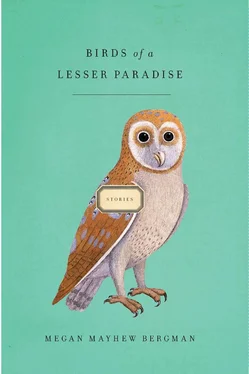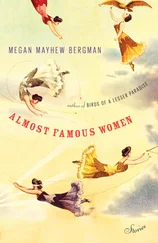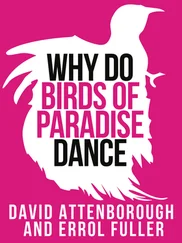Smith sat quietly and stared at the fire. For a few minutes the flames held us like a magnet, a false sun. It was as if we were early hominids or starved settlers, fugitives pausing to rest.
Come help me, I said, touching Smith’s arm and handing him the discarded tinfoil from supper. I led him a few yards away from camp. Are you mad? I whispered as we tied up our food in bear bags. I didn’t mean to snap at you earlier.
Nah, he said. I get it. You’re protecting him.
Throw this line over the tree limb, I said, handing him a rope with a sack of rocks on one end.
Dad, who was now nothing but a silhouette in front of the fire, choked a stick with his hands and practiced his putting stance. He sent clumps of pine straw flying with imaginary golf balls.
I read somewhere, Smith said, that they’ve found the ivory-billed in Arkansas. Maybe we could head down there sometime.
But I’d stopped listening. I was rushing toward Dad, who had crumpled and lay heaving on the ground. He clutched his chest and shoulder and tried to sit up. Betsy lay down beside him.
Breathe, I said, coaxing him to lie back down on the ground. Breathe, Dad.
Even as I tried to calm my father, I could feel panic overtake me. I couldn’t let Dad die out here. I had to be rational, make the right decisions.
Elevate his head, I shouted to Smith, who stood behind me, as if waiting for instruction.
Smith dropped to the ground and put Dad’s head in his lap. Do you have aspirin? I asked.
Dad shook his head. Smith, too.
Don’t worry, I said, though I felt as if someone had hit my skull with a blunt shovel.
We have to get him out, I said to Smith. I think he’s had a heart attack. Or a stroke. I don’t know.
You run, I said. Grab a flashlight and my phone and run until you have service. Tell them we are roughly one half mile from the place where the groomed trail becomes a footpath near the old logging camp.
Smith stood up. He looked drunk, tired, shocked.
Go, dammit!
I hated myself then, for letting a stranger into our life, for having to trust this stranger to save my father. Smith sprinted into the woods. Betsy hesitated, then followed him.
I sat Indian-style on the sandy soil next to the fire and cupped Dad’s head, bringing it gently into my lap. I massaged his temples and jawline.
You’re going to be okay, I said. You have to believe that.
I’m sorry, he said. His voice was small and strained.
Don’t talk, I said, trying to sound calm. Just rest. Rest and breathe.
When you camp in the swamp at night, you know there are bears. There are hundreds, and they smell you, and they’re curious.
Everything sounds large at night — raccoons, squirrels, a startled deer.
But nothing was as fierce and wild as me. I was furiously alive.
Dad told me once that he knew how to do many things — rig a trap for a prize mink, field dress and butcher a buck, navigate by the Southern Cross, but when I was born he didn’t know how to feed or burp me. Your diapers were in a knot, he said, or sliding down your legs. I forgot to brush your hair. I couldn’t keep your face clean. Your mother was dead. Those were hard times.
He was sorry, but I wasn’t. I couldn’t picture that grieving, incompetent father. I remembered the stacks of bird books, flash cards, and faded Audubon prints. Stories of him looking for Carolina parakeets as a boy, begging his father to stop logging, hoping he’d still find a viable pair in the swamp.
Remember, he’d tell me. Birds need dead trees for nesting and foraging.
What I never told Smith was that Dad had left years earlier for Arkansas at the news of a possible discovery of the ivory-billed. He’d driven his pickup to the protected tract and quietly trespassed for two weeks, tape recorder in hand. For most of his life, he’d been desperate to believe in the bird’s existence.
Your mother believed, too, he’d said.
I tried to find my mother in my dreams. In college, when I got high, I’d sit on the roof of my dorm with my eyes closed and search for pieces of her inside myself. I figured that the parts of me I didn’t understand — those I couldn’t trace to the bearded man knee-deep in juniper water back home — were her. My perfectionism, my temper, my love of heat — and, as my father reminded me, the way I sang to myself — off-key, pitchless, hopeful.
I don’t like thinking about those four hours in the pitch-black swamp night. The fear in my gut, Dad’s arrhythmic breathing, the sounds of snapping limbs and rustling leaves. Suggestions.
An emergency squad rode into the swamp on two ATVs. I heard the sounds of their machines and voices and as soon as I saw their lights, I cried. They loaded Dad onto a stretcher but didn’t have room for me, so I left our gear in the middle of the woods and jogged after the ATVs with my flashlight. The sound of the ATVs quickly disappeared and I found myself running, tripping over tree roots, tears mingling with the sweat on my face, sand in my teeth, the rocks hard underneath my boots.
As the swamp opened up to the logging road, and the logging road opened up to the highway, I looked for Smith and Betsy, but I was alone.
I brought Dad home from the hospital two days after the heart attack; he was to rest before the quadruple bypass his doctors had scheduled. I hadn’t heard from Smith after sending him into the woods, but when we arrived home, Betsy was tethered to the front porch, a bowl of water at her feet. She quivered and cried until I unleashed her. She put her paws on Dad’s knees, desperate for acknowledgment.
I’d been home that morning preparing for Dad’s arrival. Smith had apparently dropped Betsy off while I was gone. Perhaps he’d been watching the house or seen my car. I hoped he wasn’t avoiding me.
That Smith fellow tried to run off with my woman, Dad said, scratching Betsy’s head.
Easy, Dad, I said. Let me get you inside. I guided him to his bedroom and helped him onto the bed.
Will you keep the business up, Dad asked, until I can get back to work?
Of course, I said.
Betsy claimed a spot next to him, circling until she found the place where she could rest her chin on his knee. I dragged the television into his room, but he didn’t want it on.
Can you make me a fruit salad? he asked. And a fried egg sandwich?
I nodded. That afternoon, I nailed a platform underneath Dad’s bedroom window where I could spread birdseed.
Eventually, Dad said, I should get out of your way, go somewhere with railed showers.
You’re staying here, I said. You’re going to be as good as new. New was never all that good, he said.
You’ll be fine, I said.
Despite our verbal optimism, we felt our lives turning. We felt the beginning of something sad.
Dad shook the newspaper — a habitual motion — as I placed a dinner tray over his lap. He pointed at the obituaries: It’s my generation’s time, he said. Natural progression.
Don’t rush, I said.
The next morning, we quietly ate breakfast on the front porch. Dad looked out over the property.
There’s crabgrass on my course, Dad said, surveying his green.
Dad reread biographies on Jefferson and Roosevelt and tried his hand at the New York Times crossword puzzle. His complexion was sallow and he moved stiffly.
I want to be outside, he said after two days. He looked out the window like a sad dog.
Give it time, I said. But part of me felt that depriving him of the outdoors — the sulfur smell of the swamp air, his putting green, the trails he walked daily behind our house — was akin to starvation.
The next morning, I made him breakfast and opened his windows. Then I walked down our gravel driveway to organize the latest team of bird-watchers and drive them into the swamp. I emulated the speeches I’d heard from Dad: Try to become part of the forest. Be patient and humble. Find the dead trees. He had a way of exciting our customers; I felt condescending.
Читать дальше












